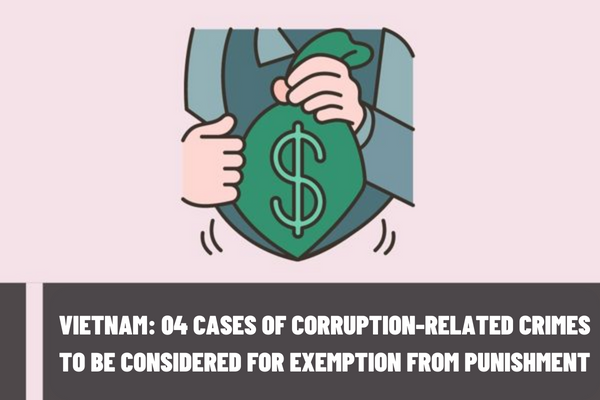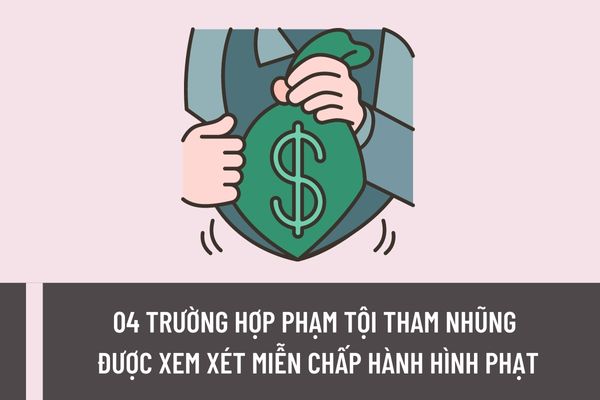Vietnam: 04 cases of corruption-related crimes to be considered for exemption from punishment? Will a person who launders money obtained from corruption be prosecuted for both crimes?
Will a person who launders money obtained from corruption be prosecuted for both crimes?
Pursuant to Article 7 of Resolution No. 03/2020/NQ-HDTP stipulating criminal prosecution in case the offender uses the corrupted property to commit money laundering in Vietnam as follows:
Criminal prosecution in case the offender uses the corrupted property to commit money laundering in Vietnam
If the offender uses the corrupted property to commit any of money laundering acts prescribed in Article 324 of the Criminal Code, apart from facing the criminal prosecution as for the equivalent offense in Chapter XXIII of the Criminal Code, the offender also faces the criminal prosecution for money laundering as prescribed in Article 324 of the Criminal Code.
E.g. Nguyen Van A embezzled VND 5,000,000,000, then A used this sum of money to invest and do real estate business to hide its illegal origin. In this case, A will face criminal prosecutions for embezzlement as prescribed in Article 353 and for money laundering as prescribed in Article 324 of the Criminal Code.
Thus, when satisfying the composition of the crimes, the person performing the act must be responsible for the crimes of the Chapter of corruption and money laundering in Article 324 of the 2015 Criminal Code of Vietnam.
Vietnam: 04 cases of corruption-related crimes to be considered for exemption from punishment? Will a person who launders money obtained from corruption be prosecuted for both crimes?
In which case is it considered to be exempt from punishment for corruption-related crimes?
Pursuant to Clause 1, Article 5 of Resolution No. 03/2020/NQ-HDTP, approaches to corruption-related or office title-related crimes shall ensure the strict and thorough compliance with the rules of the criminal and criminal procedure laws.
Regarding the exemption from punishment execution, Clauses 2 and 3, Article 5 of Resolution No. 03/2020/NQ-HDTP have the following content:
Approaches to corruption-related or office title-related crimes
…
2. In any stage of the proceedings, if the offender of embezzlement or taking bribes has voluntarily returned at least three fourths of the property embezzled or bribes taken and has closely cooperated with the authorities in the process of detection, investigation or trial of the crime or has made reparation in an effort to atone for the crime, he/she will not face the highest level of the sentence bracket for which he/she has been prosecuted or adjudicated.
3. The offender might be exempt from punishment as he/she deserves the leniency as prescribed in Article 59 of the Criminal Code if he/she has at least 02 mitigating circumstances as specified in clause 1 Article 51 of the Criminal Code or he has prior criminal record as a helper in a complicity but with a insignificant role in any of the following:
a) The offender has no personal gain motive or other self-seeking purposes, but merely seeks to achieve innovation or breakthrough in the socio-economic development and defense of the Fatherland;
b) The offender has a dependent relationship (such as subordinate and superior, salary earner, performing duties under the director of his/her superior), is not fully aware of his/her criminal act, has no personal gain motive or other self-seeking purposes, receives no benefit from the crime; not benefiting; has voluntarily reported the crime before being discovered, and has closely cooperated with the authorities in the process of detection, investigation or trial of the crime;
c) The offender has voluntarily reported the crime before being discovered, has closely cooperated with the authorities, has helped limit the damage, has voluntarily returned the property appropriated, has remedied all of the consequences and has made restitution for the damage caused;
d) The offender, upon being discovered, has expressed cooperative attitude and showed his/her repentance and desire to redeem his/her faults, has voluntarily returned the property appropriated, has remedied all of the consequences and has made restitution for the damage caused.
Thus, the offender might be exempt from punishment as he/she deserves the leniency if he/she has at least 02 mitigating circumstances or he has prior criminal record as a helper in a complicity but with an insignificant role in any of 04 cases mentioned in Clause 3, Article 5 of Resolution No. 03/2020/NQ-HDTP.
Corruption can be criminally prosecuted for which crimes?
Pursuant to Section 1, Chapter XXIII of the 2015 Criminal Code of Vietnam, corruption-related crimes include:
+ Embezzlement
+ Taking bribes
+ Abuse of power or position for appropriation of property
+ Abuse of power or position in performance of official duties
+ Acting beyond authority in performance of official duties
+ Abuse of power or position to influence another person for personal gain
+ Commission of fraud in performance of duties.
LawNet
